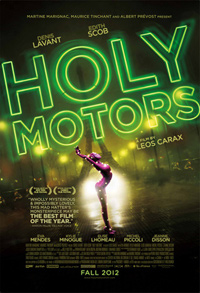 The kind of film the Cannes Film Festival, and cinema itself, was meant for, Leos Carax’s Holy Motors is a deranged, exhilarating miracle of a film that is almost impossible to make logical sense of – not that that matters. As majestic as the film is in craft, innovation, and singular weirdness, the lead role played by regular collaborator Denis Lavant is a masterpiece in and of itself. Playing at least ten different characters over the nearly two-hour duration, Lavant gives a shape-shifting performance that even makes Laura Dern’s quadratic turn in INLAND EMPIRE look somewhat paltry in comparison.
The kind of film the Cannes Film Festival, and cinema itself, was meant for, Leos Carax’s Holy Motors is a deranged, exhilarating miracle of a film that is almost impossible to make logical sense of – not that that matters. As majestic as the film is in craft, innovation, and singular weirdness, the lead role played by regular collaborator Denis Lavant is a masterpiece in and of itself. Playing at least ten different characters over the nearly two-hour duration, Lavant gives a shape-shifting performance that even makes Laura Dern’s quadratic turn in INLAND EMPIRE look somewhat paltry in comparison.
Is Carax’s opus a series of short films with a connective conceit? A rumination on digital-age avatars and humanity’s loss of identity, self, and body? Or maybe it’s an apocalyptic fever dream that imagines – cinematically – the meeting of all movie and theatre genres in a single place. Whatever it is and wherever it came from, how lucky we are that a movie like this can still rear its head and remind us of what the medium can do above all other artistic media.
To try to describe the plot for this madness, Holy Motors features Denis Lavant as Monsieur Oscar, an apparently wealthy man who proceeds through a set of nine appointments over several hours, driven around in a limousine by a chauffeur who guides him from day into the dead of night. These appointments aren’t business meetings, per se (at least not in any conventional sense), but rather varieties of role-playing tasks that seem to arbitrarily end whenever an unstated goal has been satisfied. These don’t appear to be tests or challenges, though, and they most closely resemble a performance artist cycling through a set of theatrical ideas and personas, carried out in the real world.
Anyone who saw the 2008 triad omnibus film Tokyo! will already be familiar with M. Oscar’s persona for his third appointment, Monsieur Merde. A leprechaun-esque thing that scours the sewers, M. Merde occasionally emerges to terrorize civilians with his freakish antics; in this case, he woos a fashion model played by Eva Mendes, who sings him lullabies in a cave while he eats her hair in the nude. By the time this occurs, it’s par for the course.
While the film can easily get by (to put it mildly) on the strength simply on the strength of its mere euphoria alone, Holy Motors isn’t entirely a head-scratcher underneath its surface. For starters, the motor of the title plays a big role here, whether in reference to automobiles, cinematic apparatuses, or the virtualization of the human body in the digital age of living. With scant continuity cues in the narrative, this is a film founded on mood and thematic registrations.
Apocalyptic to its very core, there is a palpable teleological suggestion that Carax’s world is set at the endpoint of humanity and cinema. Humans only exist to be elsewhere (or someone else), and CGI and digital artifacts (e.g. datamoshing) crop up just as often in the film as brief zoopraxiscopic silent film interludes, reminding us that this ain’t no celluloid picture being projected. Embracing the absurdity and wonder of the delirious universe he’s created, Carax has created a cinematic trifecta of beauty, humor, and wonder that almost never rears its head so masterfully.
Reviewed on May 23rd at the 2012 Cannes Film Festival – Main Competition Selection
115 Mins


